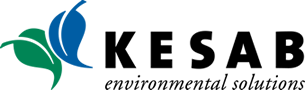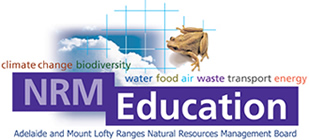
The NRM Education program is funded by the Adelaide and Mount Lofty Ranges Natural Resources Management Board with a vision of seeing all schools and preschools working with their communities to develop the knowledge, skills and values to live sustainably.
The partnership NRM Education has with its host, KESAB environmental solutions, is invaluable to the NRM Education Team whose primary role is to facilitate culture change in preschools, schools and the tertiary sector.
Having access to knowledge and information around the latest in waste education has been a strong value add, enabling the NRM Education and Wipe Out Waste teams to better support (pre)schools, improving outcomes for both programs.
NRM Education Central Adelaide Fast Facts
- 233 (pre)schools engaged with NRM Education, 176 of these are registered with the Australian Sustainable Schools Initiative in South Australia (AuSSI-SA). A total of 3,733 students, children, staff and parents were directly involved in activities.
- 50 schools and preschools documented sustainability initiatives in their School/Site Environment Management Plans (SEMP).
- 28 teacher training events; 461 educators from 59 schools and preschools attended.
- 26 new resources developed, including ID charts, case studies, newsletter articles: embedding EfS, various flora and fauna articles.
- 13 community talks and field days held, including Science Alive, the World Environment Fair and workshops about local frogs to promote the Frogspotter App – an initiative that allows citizens to become the scientists. These activities had a reach of over 10,800 members of the community.
- 6 Youth Environment Council (YEC) of South Australia Events coordinated and facilitated – including 2017 Leadership Camp and Sharing and Celebration Forum, 2018 YEC Mentor Camp, Sustainability Forum, and Leadership Camp, and a 20 year YEC celebration.
- 35 reports from 15 schools on progress towards embedding Education for Sustainability. More than 4,367 students, educators and community members, those being involved in 13,342 instances of engagement in learning about, contributing ideas, or taking action on sustainability.
Key partnerships and events
Partnerships are a key ingredient to success. The NRM Education program works in partnership with local government, non-government organisations (NGOs), business and other State Government departments on projects that have increased support and resources available to schools and preschools to learn with their communities about living more sustainably.
Over the last 12 months, NRM Education staff worked with 49 partner organisations on a range of activities, some of which are outlined below.
KESAB Sustainable Communities Awards
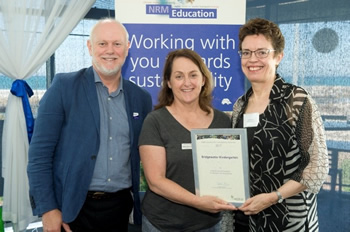
Bridgewater Kindergarten received a certificate of recognition for their efforts in embedding Education for Sustainability at the NRM EfS Showcase
The NRM Education for Sustainability Showcase was coordinated by the team and wrapped into the broader KESAB Sustainable Communities Awards and Expo on 28 November 2017.
Outcomes were that nine sites from the AMLR region received recognition, and two of these presented a five minute showcase about their efforts to 80 guests; with feedback that attendees identified new ideas on initiatives to try at their own schools.
The AMLR sites to receive recognition were:
- Banksia Park Kindergarten
- Banksia Park School R-7
- Blackwood Primary School
- Bridgewater Kindergarten
- Clarence Park Community Kindergarten
- Concordia College Early Learning Centre
- Reynella South School Preschool
- Torrensville Primary School
- West Beach Primary School
OPAL food garden PD partnership
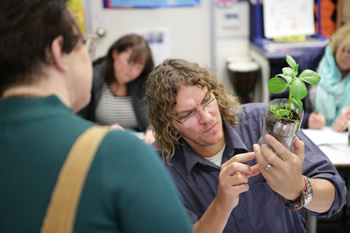
Educators gaining hands on skills to learn about the benefits and process of developing wicking beds at the Food Garden PD
NRM Education partnered with community development staff from the Cities of Holdfast Bay and West Torrens to deliver a series of four professional development sessions for educators. The sessions focussed on managing and using school food gardens, and each was hosted by a different primary school. Council staff approached schools and took bookings, while NRM Education ran the sessions and organised presenters.
In addition to having a site tour and the opportunity for participants to share ideas and ask questions, each session highlighted a particular area of food gardening. Topics included starting and sustaining a food garden; composting at school; propagation; and linking food gardens to classroom learning and the Australian Curriculum.
Feedback from participants was sought at each session, and was overwhelmingly positive, with one educator writing, “Always a great couple of hours. Really appreciate getting out there amongst it in schools and hearing and seeing their stories”. Educators also recorded their topics of interest for future sessions, which has given a long list of ideas to explore in 2018.
Low Carbon Schools
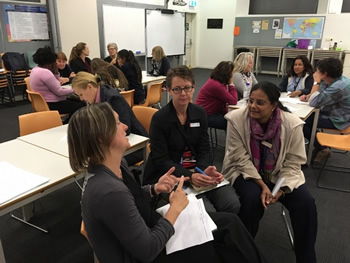
At the Low Carbon Schools Learning Group PD, educators discuss initiatives that are currently happening at their sites and how they link to climate change
Beginning in 2017, the NRM Education team formed a partnership with the Carbon Neutral Adelaide-funded Low Carbon Schools (LCS) Trial Program, which aimed to support Adelaide schools to explore site carbon reduction opportunities. This partnership formed due to NRM Education’s mutual objective of facilitating school sustainability initiatives, their strong, existing school support structure, as well as many AuSSI-registered sites expressing a particular interest in climate change.
As part of this partnership, the Central Adelaide NRM Education team assisted in the formation of a Carbon Reduction Learning Group for educators and students interested in climate change and carbon reduction. Through face to face sessions held once a term, the Learning Group provides participants with opportunities to learn about relevant topics, access useful resources, share their site’s sustainability activities and learnings, and plan further sustainability and carbon management activities.
The Learning Group network consists of over 50 educators who are invited to attend sessions, with two successful sessions facilitated so far in 2018. The term 1 session, attended by 19 teachers from 10 different sites, involved a climate change professional development segment; an introduction to the topic of school carbon management; an outline of relevant resources, activities and case studies; and a NRM Education staff-facilitated next steps planning session. The term 2 session, attended by 20 teachers and three students from 12 different sites, comprised a mapping exercise of participating sites’ current, relevant initiatives; an exercise to identify links between current sustainability initiatives and climate change; a presentation from a participating site; small group discussions regarding different carbon reduction pathways; and a planning session.
While the LCS Trial Program concluded in June 2018, the success of the Learning Group to date has led the Central Adelaide NRM Education team to continue facilitating sessions once a term. These sessions will have a strong focus on sharing opportunities for participants, and activities and topics of interest to the group. NRM Education staff will also be sharing learnings from their partnership with the LCS Trial Program through facilitation of a workshop at the Australian Association for Environmental Education Conference in October this year.
FrogWatch SA
NRM Education staff has continued to support the FrogWatch SA program, which was launched in 2016.
During 2017, a total of 466 surveys were submitted by 111 different participants and analysed by NRM Education staff. Recordings were submitted throughout South Australia, including surveys from the South East; Kangaroo Island; Eyre Peninsula; SA Murray Darling Basin; Adelaide and Mount Lofty Ranges; Yorke Peninsula; and the far North West of South Australia.
Sixteen different frog species or call races were detected, including the vulnerable Southern Bell Frog and the rare Bibron’s Toadlet. Also of interest were recordings of the Spotted-thighed Frog on Eyre Peninsula. This particular species is endemic to Western Australia but has become established in some wetland areas in Streaky Bay.
There were also a number of recordings of Peron’s Tree Frog in the AMLR region, including sites at Fairview Park, Woodside, Hahndorf, Aberfoyle Park and Meadows. This species has a natural range including the Murray Valley and isolated swamps in the South East and is believed to have become established in the AMLR region via the pet trade.
In addition to the analysis of surveys, NRM Education staff supported FrogWatch SA through numerous radio, television and printed media stories, including appearing on the Ten Network’s SCOPE and Totally Wild science programs for children and young adults, and Radio Adelaide’s Barometer science show. Presentations were also made at a number of community and special interest groups, the World Environment Fair, and the Mt Pleasant Natural Resources Centre. Staff also participated in the Oaklands Wetland Bioblitz in October.
Wipe Out Waste Partnership
NRM Education works closely with the KESAB Wipe Out Waste Program and in the last financial year there were over 30 schools and preschools provided with the benefits of an integrated delivery model.
Star of the Sea School has worked with both NRM Education and Wipe Out Waste for many years and was lucky enough to be visited by the crew from ABC’s War on Waste. They worked with students and staff at the school to capture their story which was then aired as the fourth episode of the series’ first season.
The outcomes for a year 10 student leader at Mitcham Girls High School also highlight the strength of the collaboration between the programs. This student has attended the NRM Education coordinated Youth Environment Council for several years and has been supported and inspired to set up a recycling program at the school. Wipe Out Waste has carried out audits, provided advice and recommendations to the school and NRM Education has provided a continuous in-school presence supporting this young leader to initiate a student environment group with a focus on running and maintaining the school’s waste system. The student leader has developed interpersonal, leadership skills, literacy, a sense of civics and citizenship, wellbeing, and a stronger moral purpose assisted by the collaboration between WOW and NRM Education.
Youth Environment Council
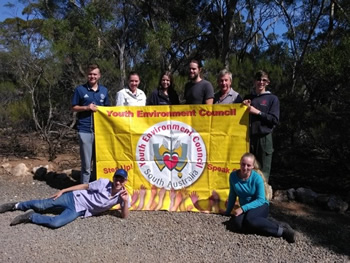
The 2018 Youth Environment Council mentors at Yookamurra Sanctuary for their Mentor Camp
The Youth Environment Council of SA (YEC) began in 1997 as a ministerial advisory forum for young people to express their environmental concerns to the government. Twenty years on and the partnership between the Education and Environment Departments continues with the initiative being coordinated and delivered across the state by the NRM Education program.
The YEC provides the opportunity for school students aged between 11 and 17 to find their voice in order to drive projects that tackle environmental problems. The successes and outcomes from that partnership show the importance of including young people in decision making and action taking, thereby benefitting the future of our community as well as our environment.
Some 600 students have been through the YEC during its 20 year history and, as we have found by a recent survey, it has made a significant impact on their lives. The ripple effect of their time in the YEC suggests that young people will step up to the challenge when given the opportunity but importantly that they will take those skills, values and beliefs into their adult lives.
To celebrate the 20 years of the YEC, a celebratory event was held to showcase the past and present students of the council. Over 100 current and past members, staff from supporting organisations, parents of current members and other guests attended the event. Speeches from YEC members past and present highlighted the success of the program as having strong Education for Sustainability outcomes that have continued on through people’s lives.
Youth Environment Leaders
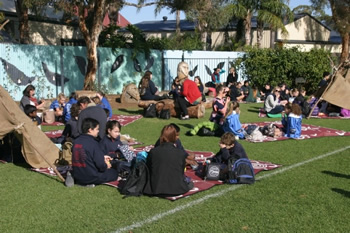
Youth Environment Leaders bus tour where students and teachers networked to learn about sustainability initiatives at other schools
The NRM Education team ran a Youth Environment Leaders bus tour, visiting three sites and having five site presentations. Students and their supporting teachers toured other school sites, learnt from other student groups and shared their own sustainability successes and challenges. The students facilitated and participated in hands-on activities, and shared and developed their skills and knowledge regarding sustainability action. The feedback from the 47 participants from nine sites attending was that it was a worthwhile and successful day generating ideas and enthusiasm for students to tackle projects back at school and in their communities.
